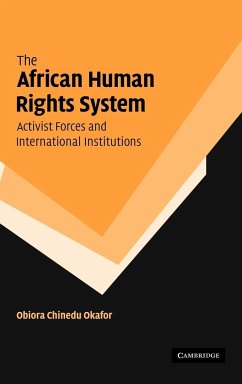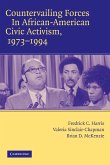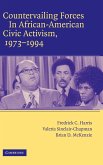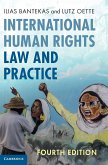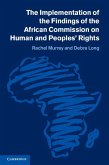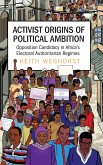Detailed case studies of the African human rights system operating within Nigeria and South Africa.
This book draws from and builds upon many of the more traditional approaches to the study of international human rights institutions (IHIs), especially quasi-constructivism. The author reveals some of the ways in which many such domestic deployments of the African system have been brokered or facilitated by local activist forces, such as human rights NGOs, labour unions, women's groups, independent journalists, dissident politicians, and activist judges. In the end, the book exposes and reflects upon the inherent inability of the dominant compliance-focused model to adequately capture the range of other ways - apart from via state compliance - in which the domestic invocation of IHIs like the African system can contribute - albeit to a modest extent - to the pro-human rights alterations that can sometimes occur in the self-understandings, conceptions of interest or senses of appropriateness held within key domestic institutions within states.
Table of contents:
1. The African human rights system, activist forces, and international institutions; 2. Conventional conceptions of international human rights institutions; 3. Conventional conceptions of the African system for the promotion and protection of human and peoples' rights; 4. The modest impact of the African system within Nigeria; 5. The limited impact of the African system in South Africa; 6. The limited deployment of the African system within states; 7. Toward an extended measure of IHI effectiveness; 8. Conclusion.
This book draws from and builds upon many of the more traditional approaches to the study of international human rights institutions (IHIs), especially quasi-constructivism. The author reveals some of the ways in which many such domestic deployments of the African system have been brokered or facilitated by local activist forces, such as human rights NGOs, labour unions, women's groups, independent journalists, dissident politicians, and activist judges. In the end, the book exposes and reflects upon the inherent inability of the dominant compliance-focused model to adequately capture the range of other ways - apart from via state compliance - in which the domestic invocation of IHIs like the African system can contribute - albeit to a modest extent - to the pro-human rights alterations that can sometimes occur in the self-understandings, conceptions of interest or senses of appropriateness held within key domestic institutions within states.
Table of contents:
1. The African human rights system, activist forces, and international institutions; 2. Conventional conceptions of international human rights institutions; 3. Conventional conceptions of the African system for the promotion and protection of human and peoples' rights; 4. The modest impact of the African system within Nigeria; 5. The limited impact of the African system in South Africa; 6. The limited deployment of the African system within states; 7. Toward an extended measure of IHI effectiveness; 8. Conclusion.

